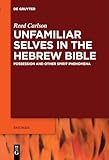Unfamiliar Selves in the Hebrew Bible : Possession and Other Spirit Phenomena / Reed Carlson.
Material type: TextSeries: Ekstasis: Religious Experience from Antiquity to the Middle Ages ; 9Publisher: Berlin ; Boston : De Gruyter, [2022]Copyright date: ©2022Description: 1 online resource (XV, 201 p.)Content type:
TextSeries: Ekstasis: Religious Experience from Antiquity to the Middle Ages ; 9Publisher: Berlin ; Boston : De Gruyter, [2022]Copyright date: ©2022Description: 1 online resource (XV, 201 p.)Content type: - 9783110669343
- 9783110670066
- 9783110670035
- 221.6 23
- online - DeGruyter
- Issued also in print.
| Item type | Current library | Call number | URL | Status | Notes | Barcode | |
|---|---|---|---|---|---|---|---|
 eBook
eBook
|
Biblioteca "Angelicum" Pont. Univ. S.Tommaso d'Aquino Nuvola online | online - DeGruyter (Browse shelf(Opens below)) | Online access | Not for loan (Accesso limitato) | Accesso per gli utenti autorizzati / Access for authorized users | (dgr)9783110670035 |
Frontmatter -- Contents -- Abbreviations of Sources -- Textual Conventions -- Acknowledgments -- 1 The Ghost of a Self -- 2 Raising the Specter -- 3 Getting into the Spirit -- 4 When a Spirit Moves -- 5 In Good Spirits -- Bibliography -- Index of Ancient Sources -- Subject and Author Index
restricted access online access with authorization star
http://purl.org/coar/access_right/c_16ec
Spirit possession is more commonly associated with late Second Temple Jewish literature and the New Testament than it is with the Hebrew Bible. In Unfamiliar Selves in the Hebrew Bible, however, Reed Carlson argues that possession is also depicted in this earlier literature, though rarely according to the typical western paradigm. This new approach utilizes theoretical models developed by cultural anthropologists and ethnographers of contemporary possession-practicing communities in the global south and its diasporas. Carlson demonstrates how possession in the Bible is a corporate and cultivated practice that can function as social commentary and as a means to model the moral self.The author treats a variety of spirit phenomena in the Hebrew Bible, including spirit language in the Psalms and Job, spirit empowerment in Judges and Samuel, and communal possession in the prophets. Carlson also surveys apotropaic texts and spirit myths in early Jewish literature—including the Dead Sea Scrolls. In this volume, two recent scholarly trends in biblical studies converge: investigations into notions of evil and of the self. The result is a synthesizing project, useful to biblical scholars and those of early Judaism and Christianity alike.
Issued also in print.
Mode of access: Internet via World Wide Web.
In English.
Description based on online resource; title from PDF title page (publisher's Web site, viewed 29. Mai 2023)


